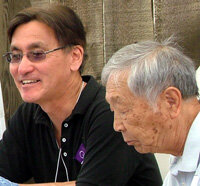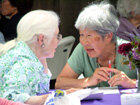Former Japanese American internees and Holocaust survivors exchanged personal stories related to their incarceration at the Gathering of Friends event that took place on June 12. As part of the program, JAMsj board member, Will Kaku, spoke about the responsibility that the next generation has in continuing the legacy of the former internees and of the Holocaust survivors. The following is an excerpt from his speech. As a museum docent, I see local students come to this museum to simply check off their requirement for their history class. To some of them, this really is just "history.”To them, your history is a grainy black and white image on our wall that depicts a distant event from some seventy or eighty years ago. For some, that may even be before their own grandmothers or grandfathers were born. Many of them simply do not see the relevance of this history and they cannot see how your story relates to their lives. And I have fears.I fear that with each passing generation, with each passing day, another first-person account is gone, another courageous voice is silenced, and the connections to your legacy are much more distant.Thus, it is imperative for my generation to pass down your history and importantly, to show people how your stories are relevant to their lives today.
As a museum docent, I see local students come to this museum to simply check off their requirement for their history class. To some of them, this really is just "history.”To them, your history is a grainy black and white image on our wall that depicts a distant event from some seventy or eighty years ago. For some, that may even be before their own grandmothers or grandfathers were born. Many of them simply do not see the relevance of this history and they cannot see how your story relates to their lives. And I have fears.I fear that with each passing generation, with each passing day, another first-person account is gone, another courageous voice is silenced, and the connections to your legacy are much more distant.Thus, it is imperative for my generation to pass down your history and importantly, to show people how your stories are relevant to their lives today. The story of Japanese Americans is an American story. It is ultimately a story about identity and it is a story about all of us. It is a story that challenges us with the whole concept of what it means to be an American; what it means to be questioned about your loyalty; and what it means to have your rights taken away during wartime. It is an issue that is pertinent to us today as we fight two wars and debate whether we should limit the civil liberties of fellow Americans and whether we should put them under special scrutiny and suspicion based on their religious and ethnic background.The story of the Holocaust is a story that challenges us about our own humanity. When we speak about the Holocaust, we boldly proclaim "Never Again.” Yet, some say that those words ring hollow, as it in fact happens again and again. Cambodia, Darfur, Rwanda, Srebrenica. We also have the audacity to label which act of genocide is more abhorrent than the other based on the color of their skin or how close the victims are to American and European sentiments or interests.It is only through your courageous stories that we can truly learn about the commonality of human experience and human suffering.The job of the next generation is to preserve and tell your stories about the human condition, and importantly, to contextual your stories so that people can see that your stories are just as relevant today. This is the role of my generation and I cherish that responsibility. I look forward to the day when we can truly say "Never Again" and those words will finally have meaning.I would like to thank all of you for your courage in sharing your stories with us today. I pledge that we will honor your legacy, uphold your courage, and carry your convictions in our hearts. We will never forget you.Contact: will@jamsj.org
The story of Japanese Americans is an American story. It is ultimately a story about identity and it is a story about all of us. It is a story that challenges us with the whole concept of what it means to be an American; what it means to be questioned about your loyalty; and what it means to have your rights taken away during wartime. It is an issue that is pertinent to us today as we fight two wars and debate whether we should limit the civil liberties of fellow Americans and whether we should put them under special scrutiny and suspicion based on their religious and ethnic background.The story of the Holocaust is a story that challenges us about our own humanity. When we speak about the Holocaust, we boldly proclaim "Never Again.” Yet, some say that those words ring hollow, as it in fact happens again and again. Cambodia, Darfur, Rwanda, Srebrenica. We also have the audacity to label which act of genocide is more abhorrent than the other based on the color of their skin or how close the victims are to American and European sentiments or interests.It is only through your courageous stories that we can truly learn about the commonality of human experience and human suffering.The job of the next generation is to preserve and tell your stories about the human condition, and importantly, to contextual your stories so that people can see that your stories are just as relevant today. This is the role of my generation and I cherish that responsibility. I look forward to the day when we can truly say "Never Again" and those words will finally have meaning.I would like to thank all of you for your courage in sharing your stories with us today. I pledge that we will honor your legacy, uphold your courage, and carry your convictions in our hearts. We will never forget you.Contact: will@jamsj.org
